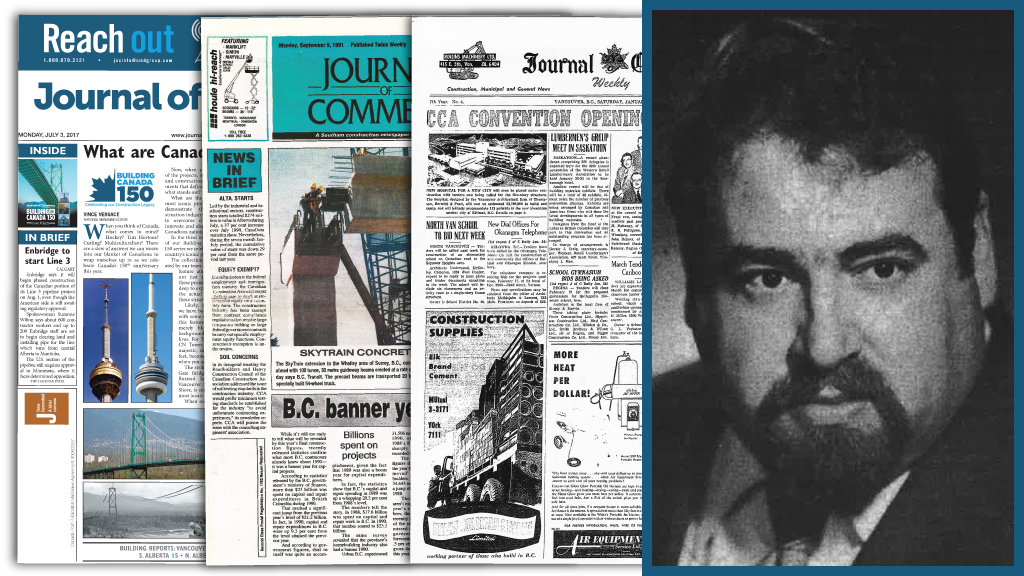Brian Martin was a gifted story teller; it is the element which raises a journalist above the pack.
There are editors and writers who are grammar marms, concerned more with the sentence structure than the substance; literary Sgt. Joe Friday’s (‘just the facts ma’am’); and those who have no concept of breadth and depth beyond a press release. But Brian could take journalism basics (the who-what-where-how-and-why) and combine it with insight but more importantly tell an engaging story of what it meant to people and the construction industry. He wrote about people for people.
He was a natural board raconteur, whether it was telling the story of how a construction company brought a building to life, writing about Journal of Commerce (JOC) former publisher Joe Whitehead as he turned up in a Scout union at work one day doffing his usually pristine white shirt and suit, or, telling the story of how his cat got was chased by racoons and narrowly made sanctuary through the front door.
How it all started
Brian, who was working for CBC Radio’s Northern Network, arrived at the Journal located on W. 12th Ave. in the 1973 to drop off freelance copy for Whitehead, who was producing a northern development issue. But, it was a bad day; staff had called in sick and a deadline loomed. Brian offered to help as he had newspaper experience. He never left the JOC after that day, staying on for more than three decades serving as its reporter, editor, and publisher and editor of B.C. Lumberman.
The W.12th Ave. office had editorial and executives office on the top floor and production in the basement where issues of the various publications were pasted up. Editor Frank Lillquist, who died in December of last year, and Brian were the team, with reporters, that made the JOC live, talk, and touch its reader. There was an ever-presence lingering smog of cigarette smoke as the crew sat around brain-storming ideas and waiting for production to bring up proofs of pages for approval.
Lillquist, besides being an editor and writer, was a talented cartoonist. Brian was a doer, someone who figured out how to get things done. He also loved humor and a good laugh. They clicked. For years their offices were the source of rolling waves of laughter. Staff, like lead shavings drawn to magnets, gyrated to their section of the building. They quipped, greeted people, traded jokes and generally made work fun as they held court. And, over the din, it was not uncommon to hear Brian reciting Robert Service’s Cremation of Sam McGee.
The print media heyday
As Brian moved into executive ranks, he demonstrated an ability to identify and bring new publications into the marketplace. It’s a skill not all possess, and he recalled how Southam Business Group, which owned the JOC and BC Lumberman in the 1980s, moved the forestry book to Quebec and dropped a high-rise building management publication in Vancouver.
“I told them they had it all wrong – high-rise publications belong in the East, forest publications here. Both of the failed,” he said, during an interview in 2011 reminiscing on the Journal’s 100th anniversary.
Brian and his staff were adept at seizing opportunity. “We invented The Leaders,” he said as the magazine highlighted the leading 150 general contractors in Western Canada. Other specialty publications where issued to chronicle the development of BC Place Stadium, Tumbler Ridge and the northeast coal development. The Journal also produced regular special editions focusing on steel, concrete and other aspects of the construction industry.
When Brian’s mother needed care, he decided to build a new house in Surrey with a suite for her. He soon discovered a market gap; often homeowners or builders had no idea of the bylaws or requirements relating to home construction. The JOC produced a series of guides Building Right for municipalities in the Lower Mainland. These outlined the requirements and they were handed out by municipalities when a homeowner received permit approval. It launched the JOC into residential home construction. A change in JOC ownership would eventually phase out the guides moving it back into its mainstay ICI (industrial, commercial and institutional) niche.
Brian was never one to suffer fools. He was not afraid to disagree with someone nor would he compromise his ethics or beliefs. He was once a Vancouver Regional Construction Association (VRCA) board member who maintained that one should keep channels open with the New Democrats not just the Liberals. But, he maintains, his words fell on deaf ears. He believed in his industry and felt government and associations should stand behind it. The JOC was the voice of the industry. At one point, he wrote a scathing editorial criticizing a B.C. transportation minister after the ministry started posting on line its own legal ads rather than supporting the Journal with advertising and its readers. The ministry responded by buying a full page ad that announced it would no longer advertise in the paper.
Martin had the ability to see how social change impacted the industry whether it was moving towards green building, new trends, or knowing the significance of events. Expo 86 was a landmark event for the construction industry as the SkyTrain was built along with a barrage of new structures and site pavilions. The JOC was there and paced each development throughout. But, Expo 86 also brought some of the most raucous labour strife as open and closed shop companies clashed. The construction industry in Vancouver at that time was 80 per cent union and 20 per cent open shop. In the end, a settlement was negotiated, and it began change reversing those percentages.
Changing times
Computer technologies impacting publishing and negating the need for a downstairs production facility moved the JOC to its current Burnaby location. Brian acknowledged hat he hated computers “with a passion” when they first arrived, but he soon realized they were the wave of the future. He never became a ‘mojo’ – the slang term for today’s mobile journalist who tweets and files electronically, but remained an ‘old-jo’, favouring the old ways of doing things. He set up interviews by phone but liked to go out to the person’s office or site and interview face-to-face. It reaped benefits at public events as he was able to readily identify people or stop to chat.
In 1988, Brian and the JOC founded what would become the Vancouver Regional Construction Association’s (VRCA) Awards of Excellence, recognizing outstanding achievements by the construction industry. That year’s single award went to Dominion Construction for the MacDonald Dettwiler Building in Richmond. Today, it has grown into a major event honouring excellence from contractors, subcontractors, trades and suppliers with the VRCA administering the awards. For many years, he served as the chairman of the awards committee. Martin can also be credited with starting the CEO Breakfast at the BC Construction Show which is now Buildex Vancouver.
In retirement
During his career Brian was known by journalists far beyond his own construction industry scope such as Peter Caulfield, Jean Sorensen, Ward Johnson, David Hathaway, Stefan Koehl, Paul MacDonald, and columnist Bill Moore, father of Green Peace’s Patrick Moore. Some became his personal friends such as contributor Suzanne Zwarun, who for many years wrote cover stories for Macleans magazine on Alberta issues. He spent many enjoyable vacations visiting with her Alberta farm. It would be a friendship, like many, that endured to the end.
He retired from the Journal in 2003 but remained active in the industry and his community. He was always battling health problems in retirement but just as he overcame problems and challenges in publishing, he seemed to overcome them as well. In 2013, (while he was editing the VRCA Construction in Vancouver quarterly), it was discovered he had lung cancer. He underwent surgery to remove the tumor and greeted his doctor at the hospital door the next day. “Didn’t they operate?” she asked shocked to see him up and about. Yes, he replied, it was minimal invasive surgery and he came out with flying colours. He loved to tell how he became the “miracle child” walking away from a deadly disease.
Brian retired from writing but focused on taking more time to himself, his garden, working with his church group, helping to repair and build the facility but always with a sense of humour or wit. Only a year before his death, he wrote this email:
“I am the (unpaid) property manager with Northwood United Church. I’m not for or against any part of their theology. I’ve reminded them on several occasions that I am just as comfortable in the Sikh temple down the street as I am in our own church. Biggest difference being the food at the temple is very much superior. The United Church, however, does a lot of good in the community and there are some very good and interesting people there. My main partner in crime there is Jim Karpoff who, once upon a time was a city alderman and later NDP MP. You can imagine the heartfelt debates that sometimes break out. Anyway, this year the two of us took it on ourselves to replace the roof on the church as well as on a second building where we have a thrift store. Method was simple. We made up a list of members we know have extra cash and then we shook them down for it. From some we said we wanted $1,000 and from others $500. Guess what? The roof got replaced. It came in on time and on budget. Some people think I’m a hero. Others want to string me up. To them I have pointed out that crucifying their leaders is a time-honoured Christian way of doing things. On that cheerful note I must go.”
Jean Sorensen profiled Brian Martin in 2011 for the JOC’s 100th year anniversary special and she worked in-house at the JOC with Brian when she was assistant editor for the BC Lumberman.











Recent Comments